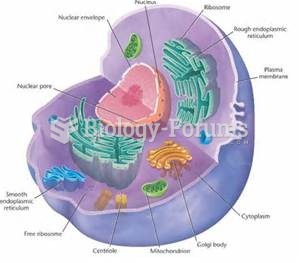|
|
|
The cure for trichomoniasis is easy as long as the patient does not drink alcoholic beverages for 24 hours. Just a single dose of medication is needed to rid the body of the disease. However, without proper precautions, an individual may contract the disease repeatedly. In fact, most people develop trichomoniasis again within three months of their last treatment.
More than 2,500 barbiturates have been synthesized. At the height of their popularity, about 50 were marketed for human use.
Human stomach acid is strong enough to dissolve small pieces of metal such as razor blades or staples.
The familiar sounds of your heart are made by the heart's valves as they open and close.
The National Institutes of Health have supported research into acupuncture. This has shown that acupuncture significantly reduced pain associated with osteoarthritis of the knee, when used as a complement to conventional therapies.







